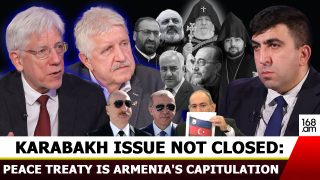Civic Engagement in Local Self-Governance
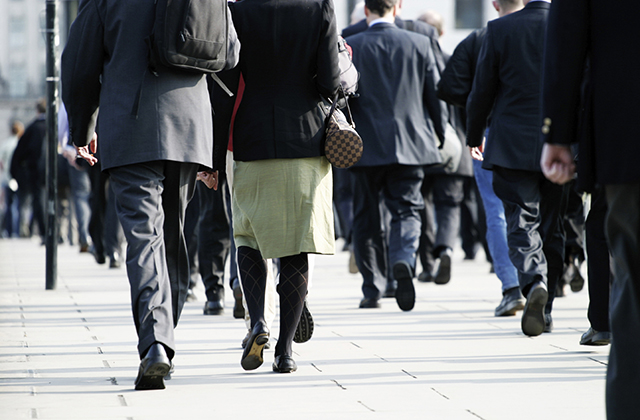
Results of representative survey conducted within “Civic Engagement in Local Governance (CELoG)” Program funded by USAID served as a ground for this brief report[1]. Survey has been conducted by the Caucasus Research Resource Center—Armenia (CRRC) in July 2015 in randomly selected 1443 households (HH) through the territory of Armenia[2].
Exercising of local self-governance in the Republic of Armenia is enshrined in the current RA Constitution, Chapter 9 (“Local self-governance”). The field of local self-government is regulated by RA law on “Local self-government” of 2002 and “European charter on local self-government” ratified by Armenia in the same year. The last two documents stress the importance of development of local democracy, in particular, participatory local governance.
Should RA local governance be considered participatory? This report attempts to reveal to which extent Armenia’s citizens are engaged in activities of their local self-government (LSG) bodies; in particular: how often do Armenia’s citizens apply to LSG bodies? Do Armenia’s citizens participate in activities and elections of LSG bodies? Is the general level of civic activity high in Armenia? Answers to these and many other questions may be found below.
Do Armenia’s citizens apply to LSG bodies to settle any issue?
Throughout six months before the survey only a little part of Armenian citizens applied to their LSG bodies to settle any issue. Moreover, that small segment, as a rule, directly applied to the head of community, exclusively for personal issues. In particular, 16.5% of respondents applied to the head of community in the mentioned period. 5.1% of respondents applied to a member of the Council of Elders and 4.5%—to any other official of local authorities. At the same period comparatively less number of respondents (1%) applied to their deputy at the National Assembly (Chart 1).
Chart 1. Did you apply to these people for personal or community issues throughout last 6 months?
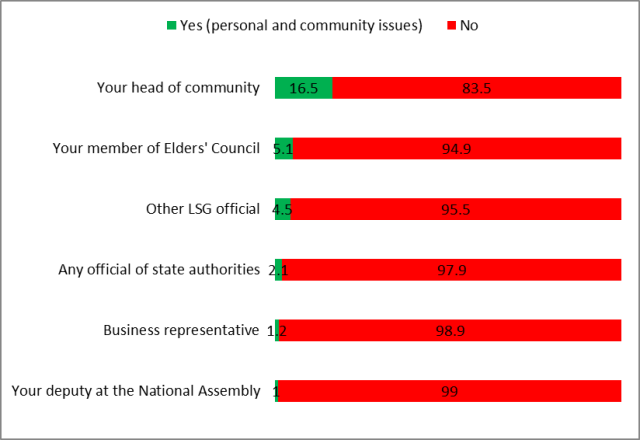
Very small part of respondents ever complained of any official for indecent behavior. Thus, 1.7% of respondents applied to the Public Relations Committee of the community, 2.5% to the Complaints Commission, and 0.9% to the Ethics Commission. It’s worth adding that about 2/3 of respondents hesitated to answer whether commissions of public relations, complaints and ethics exist in their LSG bodies.
Do Armenia’s citizens take part in activities of LSG bodies?
Insignificant number of respondents participated in activities of LSG bodies as beneficiaries in the period of last six months. In the mentioned period only 2.4% participated in the sessions of the Council of Elders, 2.3%-in the hearings on policies and programs of the community, and 1.7%-in discussions on the community budget (Chart 2).
Chart 2. Did you participate in the following events in the period of last 6 months?
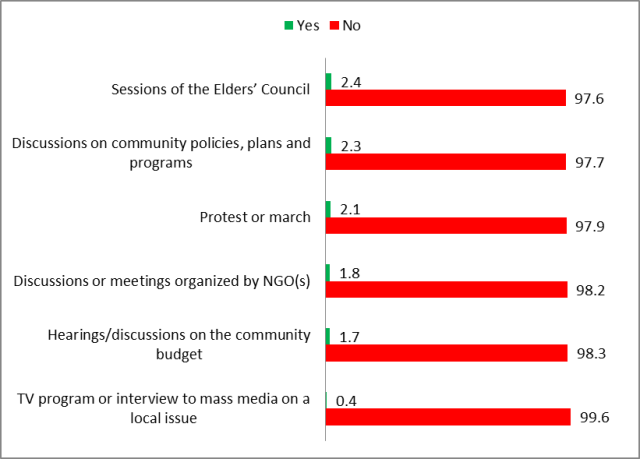
Passive participation of respondents in local governance may be conditioned by their mistrust towards possibility and productivity of that participation. To the question whether sufficient possibilities are available to participate in local governance of their community, only 32.8% of respondents answered positively. 35.9% of respondents replied that participation of community members in local governance is “partially” or “very” productive. According to 32.6% of respondents that participation is either “completely” unproductive or “less” productive.
What’s the attitude of Armenia’s citizens towards “inclusive” local governance?
Overwhelming majority of respondents is convinced that social groups needing for support should fully participate in local governance. Thus, poor and socially vulnerable people should fully take part in local governance pursuant 84.5% of respondents, persons with physical disabilities—by 83.5% of respondents, and refugees—upon 79.9%. However, the mentioned groups fully participate in local governance according to only about 1/3 of respondents.
According to the overwhelming majority of Armenia’s citizens women and young people should also fully participate in local governance. 88.3% of respondents expressed for women and 93.1%—for young people. At the same time, about half of respondents consider that young people and women are fully participating in local governance.
Paradox of participation in elections of LSG bodies
2/3 of respondents participated in recent elections of LSG bodies. In particular, 75.1% of respondents participated in voting at recent elections of the community head, and 71.8%—in recent elections of the Elders’ Council (Chart 3). Residents, who didn’t vote in the elections of the community head, explained their behavior for the following three reasons: “I decided not to vote” (33.6%), “I wasn’t registered” (17.8%) and “I wasn’t aware” (9.4%). Those not voting in elections of the member of the Council of Elders gave the same three explanations: “I decided not to vote” (35.1%), “I wasn’t registered” (15%) and “I wasn’t aware” (12%).
Chart 3. Did you participate in recent elections for…?
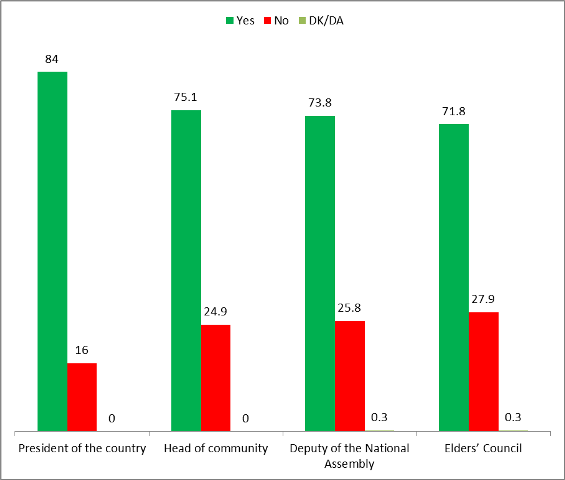
As for people’s attitude towards elections a considerable part of respondents either didn’t believe or trust in fairness and transparency of recent elections of LSG bodies. To the question “Were recent elections of the community head fair and transparent in general?” about half of the respondents—47.3% replied “yes” or “rather yes.” To the same question regarding elections of the Council of Elders the number of those, replying “yes” or “rather yes,” comprised 45.2%.
Despite lack of trust, however, 75% of respondents expressed the opinion if elections of the community head were held on the forthcoming Sunday they definitely or likely would participate in them. In case of elections of the member of the Council of Elders about the same number of respondents (74.5%) said he/she would surely or to all probabilities will participate in them.
GENERAL SNAPSHOT OF CIVIC ACTIVISM IN ARMENIA
Are Armenia’s citizens affiliated to organizations?
Insignificant part of respondents joins any formal or non-formal organization. At the moment of the survey only 1.5% of respondents were in an active or passive membership to any non-governmental or community organization/association, and 0.6% —member of any civic activity group. Degree of membership to political parties is a bit high: 2.1%, of respondents were active members and 6.7%—passive members of political parties (Chart 4).
Chart 4. What’s your participation status?
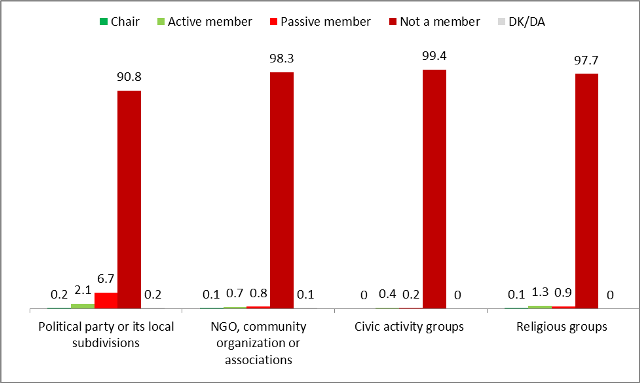
Do Armenia’s citizens take part in civic events?
In the period of six months preceding the poll participation of respondents in civic events was passive as well. For instance, only 1.8% of respondents participated in any discussion or meeting initiated by any non-governmental organization. In the mentioned period 2.1% of respondents participated in a protest or a march (see Chart 2). Interesting enough, according to more than half of participants of a protest or a march (N=30) those events have been “somewhat” or “very” productive.
What is the attitude of Armenia’s citizens towards volunteering?
Overwhelming majority of respondents has positive attitude towards volunteering. For instance, doing volunteering is “important” or “very important” for 78.7% of respondents. At the same time, 92.6% of respondents stated that for the citizen it’s “important” or “very important” to support people in worse condition (Chart 5).
Chart 5. In your opinion, how important is it for the citizen to..?
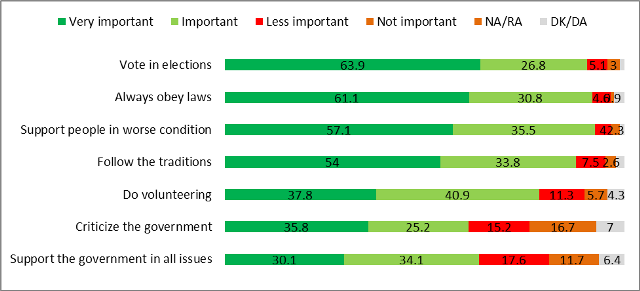
CONCLUSION
Thus, throughout the six months prior to the poll only small percent of Armenia’s citizens applied to LSG bodies to settle any issue. Respondents of Armenia as a rule didn’t participate in functioning of LSG bodies. Participation of respondents in elections of LSG bodies was rather high: approximately ¾ of respondents participated in recent elections (both of the community head and members of the Council of Elders) prior to the poll. However, less than half of respondents expressed an opinion that recent elections of the community head or members of the Council of Elders were fair and transparent.
At the moment of poll the number of Armenia’s citizens affiliated to any formal or non-formal organization is insignificant. Throughout the six months prior to the poll a small percent of respondents took part in any protest or a march. In the same period insignificant number of respondents participated in any discussion or meeting initiated by any NGO.
Apparently, participation of residents in the processes of local governance is of utmost importance. That participation is an additional factor to make functioning of LSG bodies more efficient and transparent. Presently Armenia’s local government system is far from being participatory. Accordingly, all interested parties, including state institutions, LSG bodies and civil society organizations, should exert additional efforts to boost participation of Armenia’s citizens in functioning of LSG bodies.
Caucasus Research Resource Center—Armenia (CRRC)
Survey results briefed by Tigran Matosyan
“Improving Security Policy Debates in Armenia” Programme (NED)
The Armenian Institute of International and Security Affairs (AIISA)
[1] This report was prepared thanks to the support of the people of America in partnership with USAID. Opinions/or content/ expressed here belong to the authors only but not necessarily reflects viewpoints of the USAID or the U.S. Government.
[2] For detailed methodology see Caucasus Research Resource Center—Armenia, On the Long Way of Reforms: The System of RA Local Government in the Eyes of Citizens, Yerevan 2015.











